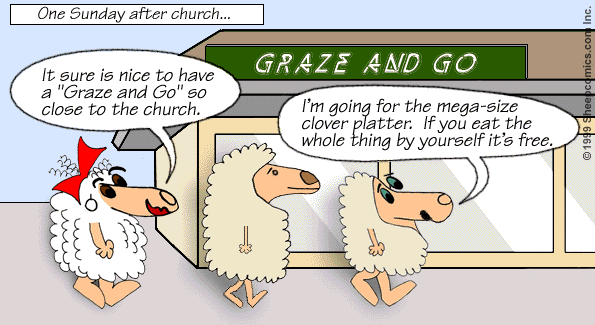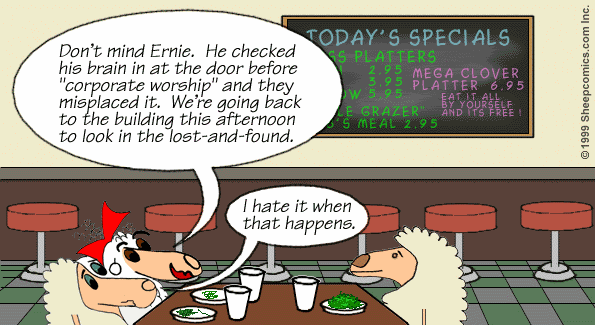



Modern American Christianity represents, to me, one of the great ironies of history. Slightly less than two thousand years ago, a group of people whose number was less than one typical modern church started a movement that changed the course of world history. Of course, I’m looking at this in worldly terms. The movement was started by God through Jesus of Nazareth. What amazes me about Christianity is how few followers Jesus had when he was crucified, and the chain of events that resulted from what those followers did with their lives. One result is the “Y2K Problem”. Whatever happened back there in history was so great that the way years are named was changed because of it. Now, many computer programs are being changed because of it.
Today in America we supposedly have millions of people following Jesus of Nazareth. Some like to think of America as a “Christian” nation. If we are, then it seems ironic that we are also close to becoming the nation with the highest percentage of its population behind bars (I have no particular source to quote, but I believe you can easily verify this).
We also, it seems, are starting to shock the rest of the world with the evil that our society is producing. For example, a very small but apparently growing segment of our children are murdering, or attempting to murder, their classmates just because they think murder is cool. I can’t remember hearing of such things back in the 1970’s (not quite ancient history) when I was in school.
Does it seem that evil in our culture is getting stronger? I can’t prove it, but on an intuitive level I believe it is. I’m not even sure exactly why this is happening. Sure, there are a lot of different factors coming into play. Pointing fingers at the media, the proliferation of guns, etc. raises some issues worth discussing, but in my opinion ultimately misses the point. I once heard a saying that “All evil needs to succeed is for good to do nothing”. I probably didn’t get that quote exactly right, but to me this is the real issue.
What are all the Christians doing while the evil in our culture is getting stronger? I’m not omnipresent so I don’t really know, but I can guess at what the vast majority of Christians will do within the next few hours. I can guess because I’m writing this on Sunday morning (before church, of course). Within the next few hours, most Christians in America will drive to church and do nothing. Is this a conscience decision? No. It’s the way the system is supposed to work.
Another great irony to me is that the most important meeting we Christians attend each week (some say the most important thing we do, period) is a large, impersonal, completely programmed event that would be no different if we didn’t attend. Yet it is absolutely essential that we do attend. In fact, where we “attend” on Sunday morning defines which church we “belong” to. If we don’t show up on Sunday morning, it’s a signal to those who know us that something is really wrong with us. (Of course, that’s if anyone notices. I attended a large corporate church for almost a decade, and when I stopped attending I didn’t get so much as a phone call from anyone.)
When we do show up, what happens? We sit down in a large group of people, most of whom we either don’t know at all or are only superficially acquainted with. The “opening prayer” really isn’t so much a communication with God as it is a signal that it’s time to be quiet and behave ourselves. (Does God really need us to tell Him when our meetings start?)
We are commanded to sing because, as most any book or paper on the subject of worship will tell you, God commands us to sing. By being forced to sing for a half hour or so every Sunday, we can check that box off on our “worship check list”. That’s the hard way, of course. In some churches you don’t have to do anything at all about singing, you just sit and “check out your brain” while a “worship team” performs for you. Sitting and doing nothing is this setting is considered “worship”.
Now, if you belong to a church that has “restored” New Testament Christianity, most likely you must perform The Lord’s Supper every week on Sunday morning. Many other churches do this less often. This event is to me one of the great paradoxes of modern Christianity. (I’m sorry if I offend any of you by what I’m about to write, but it’s based on about 100 hours of study in the Bible, the anti-Nicene church fathers, and quite a number of church history books and bible commentaries. All of these sources are relatively easy to find by anyone motivated to study this subject.)
The paradox is this. In our culture, “supper” means a meal. It is the main and probably largest meal of the day. It occurs in the late afternoon or evening. It is a time when, as anyone who grew up watching 1950’s and 60’s sit-coms knows, the whole family gets together. It is a time to relax, enjoy, commune, share food, and be close to those closest to us. Amazingly, that’s what “supper” (or the Greek word behind it “deipnon”, which means “chief meal” or “feast”) meant to a Greek, Roman, or Hebrew of the first century.
What do we know about this from the Bible? Jesus “instituted” The Lord’s Supper during a supper. The Passover to be exact. The Jewish Passover seder is the most sacred supper I can imagine, but it is a supper never the less. In First Corinthians we have a record of Christians really messing up something having to do with a Lord’s Supper. (Interestingly, there is no “the” in front of Lord’s Supper in the Greek; the “the” with a capital “T” was put there by English translators.) Paul rebuked them because some were getting drunk while others remained hungry, not because a ritual was being performed the wrong way.
Finally, we have Christians meeting to “break bread” in Troas in Acts 20:7. “Break bread” had been a colloquialism which meant “eat together” for the past thousand years in Greek writing (check out Homer’s Iliad and Odyssey). “Break bread” seems to very obviously mean “eat together” everywhere else the phrase and its variants are used in the New Testament. But in Acts 20:7 it means The Lord’s Supper. So I am to believe that these Christians held an all night meeting in a house and had nothing to eat but a shred of bread the size of my fingernail and a few drops of grape juice. It really doesn’t make much sense, unless you are determined to prove that the traditions you grew up with are infallible.
Today, what most Christians call “The Lord’s Supper” is the opposite of what “supper” means in our culture (or 1st Century Greek, Roman, and Hebrew culture). The “Lord’s Supper” I have experienced in church on Sunday morning is an exercise in mass manufactured efficiency, speed, isolation, and terror. It is accomplished as swiftly as possible, with as little physical substance as possible. The reason, I am told, we “partake” of “emblems” is because the church in Corinth messed up so badly that Paul wrote them and banned all but symbolic food from “The Lord’s Supper”. Paul was angry because the poor went hungry, so he solved the problem by getting rid of all but symbolic particles of food. Paul told the rich to eat in their houses before “The Lord’s Supper”, and the poor…well..they got as much food as they did before. The traditional interpretations of First Corinthians 11 don’t address the issue of how those who had nothing got fed after Paul banned all but a few crumbs of bread and drops of grape juice.
“Communion” isn’t really for communing at all, but for personal meditation. Paul wrote that we should examine ourselves “before” we eat the bread and drink the cup. Back then there was a “supper” between the breaking of the bread and drinking from the cup. Today the physical act of eating “emblems” only takes a few seconds, so the bulk of what is called “communion” is really private meditation. Hundreds of people gather in a big building to silently contemplate their relationship with God. In a few seconds they “partake” of the “emblems” which represent the Body and Blood of Christ, and the community meal which we can no longer have. Of course, we are all supposed to be mystically communing with God, but I can’t help but wonder why I must be “alone in a crowd” for this to happen.
Of course, we must do this all in a “worthy manner”. If we don’t, we might “fall asleep”. In other words, if we mess this up God might kill us. I’ve lost track of how many times First Corinthians 11 has been read before “The Lord’s Supper”, with the reader then warning me not to “partake unworthily” on pain of death.
What I don’t remember is being educated as to what was “unworthy” about the church in Corinth. I had to find this out through my own study. I can understand how a supper done in God’s name, which turned out to be a drunken feast for the rich and a humiliation for the starving poor, could make God very angry. What I don’t understand is how something like this could possibly occur on Sunday morning during “The Lord’s Supper”. Today, the entire experience is abstract. Whether or not we recognize the Body of Christ while we are “partaking” has no immediate physical repercussions like it did back then.
In fact, its easy to “recognize” the Body of Christ when you really don’t have to do anything for it other than sit still and be quiet. It’s a lot harder to “recognize” it when it needs to be fed or housed or becomes inconvenient. But as long as everyone lifts their bread crumb and then their little cup simultaneously and quietly, everything is OK.
Suppose someone invited you to their house for supper. Upon arriving, you are put in a room full of people and commanded to remain silent. Then someone brings you a crumb of bread and a little tiny cup with a few drops of juice. You are told than you must drink this in a “worthy” way, or you will die, and no one tells you exactly what “worthy” means. You work yourself into the most “worthy” state of mind you can and then eat the bread and drink the cup. You find yourself still alive. Your host then tells you that supper is over and that you are free to go. Would you feel loved by this? I wouldn’t. I certainly wouldn’t go back to that place for supper.
Now suppose you had to go to this person’s house for supper every week. If you didn’t, you would lose all your friends. What would happen as the weeks, months, and years go by? Would you start to resent this? Would you be tempted to hate the person who puts you through this every week? Would you at least ask what “worthy” means and why this has to happen every week? Or, would you just shut your brain off and go through the motions?
I spent years going through the motions of “The Lord’s Supper” before I started asking questions. The first question I asked was why, if God loves me, does He threaten me with death over my worthiness to eat a bread crumb and a few drops of juice? This doesn’t sound like something a loving person would do, much less a loving God. Does God care more about food particles than He cares about me?
No. What angered God in Corinth was the way people were being treated, not the way rituals were being performed. It was the rich Corinthians who cared more about food than people. God cared so much for the poor Christians in Corinth that He inspired Paul to write the dire warning to the rich Corinthians recorded in First Corinthians 11. It was an abomination to God that one part of the Body of Christ was starving while another part was feasting and getting drunk, and all in the same house!
Finally, we arrive at the part of the Sunday morning experience that is different every week: the sermon. If the preacher is a dynamic public speaker and you have a long attention span, then this can be an edifying and enjoyable experience. It’s one thing you can discuss with people after church is over. The problem is that after being in one church for years, you start to hear the same things over and over. Even the part of the assembly that isn’t predictable slowly begins to become predictable. If the preacher isn’t so dynamic, or you don’t have a long attention span, it’s another opportunity to “check out your brain”, sit, and do nothing.
Back in the 1980’s I spent about a year in a large city in the Midwest while I was on an assignment with a former employer. The church I attended for most of that time was a classic example of “nothing in action”, at least on Sunday morning.
A typical Sunday went like this. First, various members of the “worship team” performed while I sat and did nothing. Then, there was another performance during the “Lord’s Supper” while I sat and did nothing, except to “partake” on cue of course. Finally, the preacher preached his sermon. The sermons were very well delivered, but the problem is that they could have been delivered anywhere at anytime to anybody. They didn’t seem connected to what was going on in this particular group of people, in this city, at this time. They were sermons in a vacuum. When it was over, I left feeling like nothing happened. Actually, something happened, but I never did anything. My presence at that assembly was about as important at this church as my presence would have been at a Sunday matinee movie.
Every so often I read or hear of a religious leader bemoaning the decline of Christian values in America. Why is this happening? I don’t know all the reasons, but I am sure of one. Christianity, as it is most often implemented in our culture, is boring. It is boring because the most important event is a weekly performance which always happens the same way whether you show up or not. Christianity has been reduced from something you do to something that is done for you. All you have to do is show up. The outward performance is what counts. If you “check your brain in at the door”, it really doesn’t matter, as long as you behave the right way. Many of us live in our large impersonal apartments and condos (or our impersonal suburban neighborhoods), go to our large impersonal corporations to make a living, and then to our large impersonal corporate churches to get our “worship ticket” punched on Sunday.
Does God want us to live this way? No. I just did a quick CD-ROM scan of the New Testament. (New Revised Standard Version) and I found 49 occurrences of the phrase “one another” used in the context of how Christians are to serve and encourage each other. (This was a quick count, your results may vary.) None of these things are really allowed to happen at the Sunday morning meeting, the only meeting a lot of Christians attend. Encouragement is supposed to be a “one another” thing, but on Sunday only the elite paid professional is allowed to encourage anybody. It’s all one way communication by one person, every Sunday, forever. Singing is supposed to be to “one another”, but it’s really to the back of the head of the person sitting in front of you, and only when commanded. Even the concept of “supper”, a very one-another type of event, is turned upside down in the modern concept of “The Lord’s Supper”, which is about the most non-one-another kind of event there is. When all the “one-another” ministries have been outlawed by the church system, the only thing left to do is to show up and check your brain in at the door.